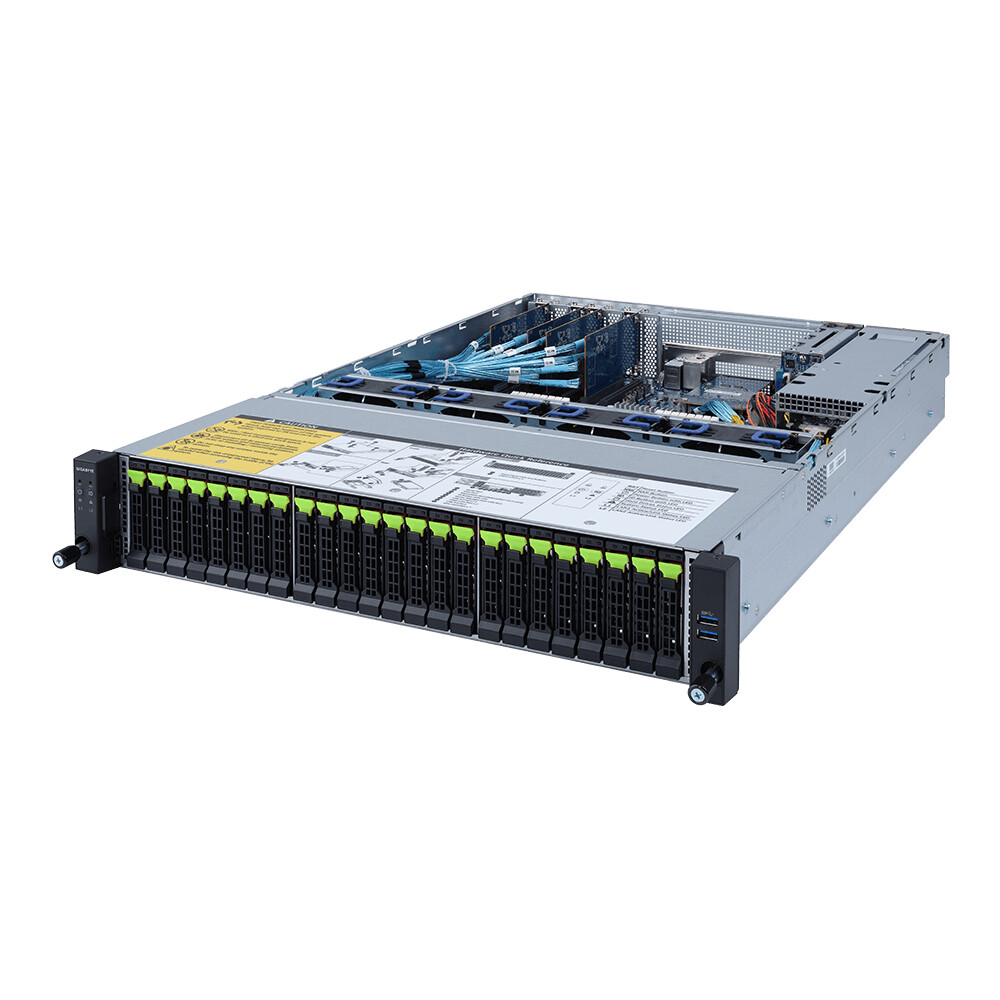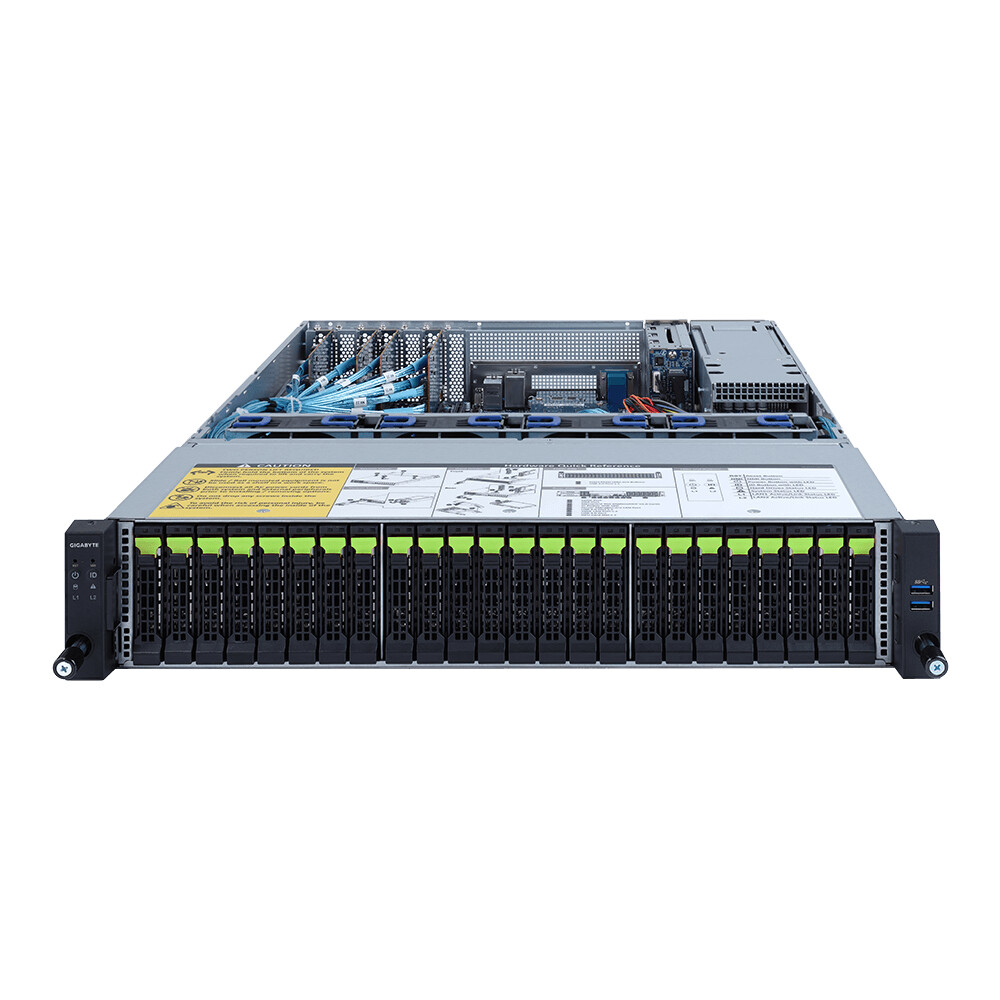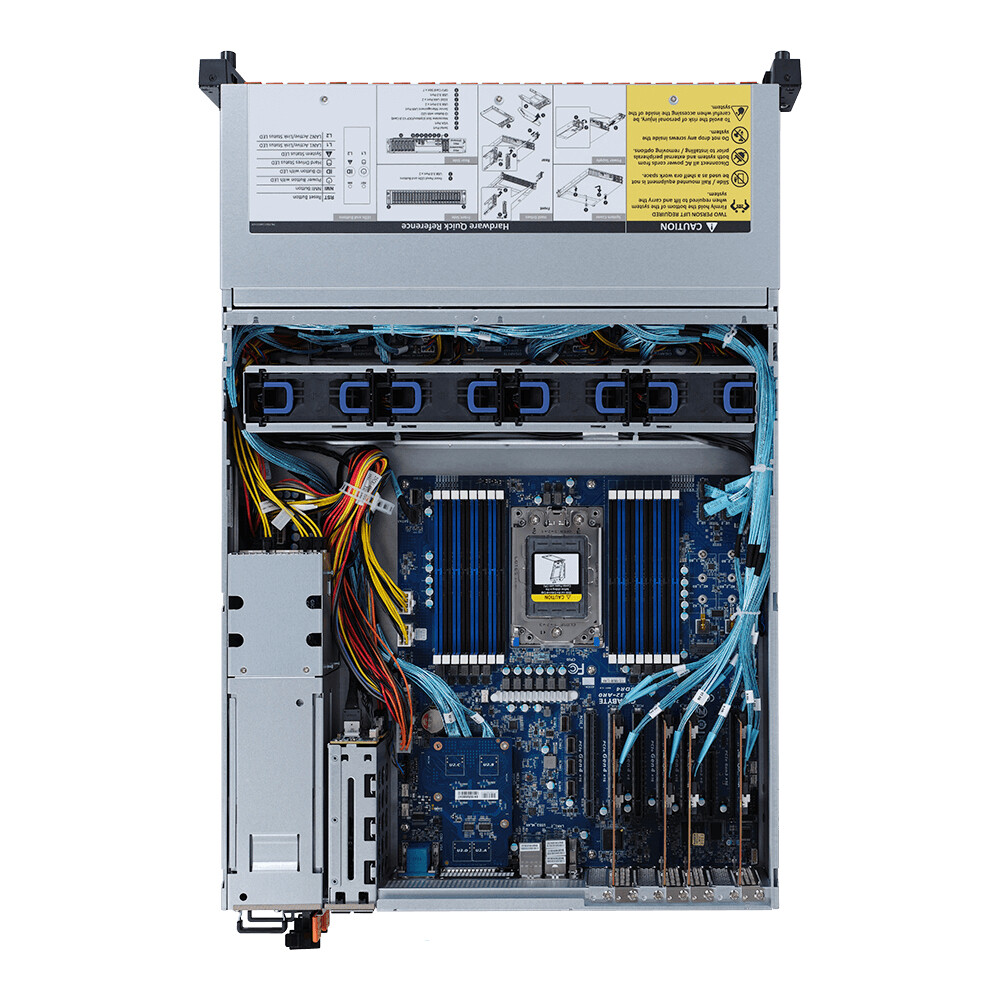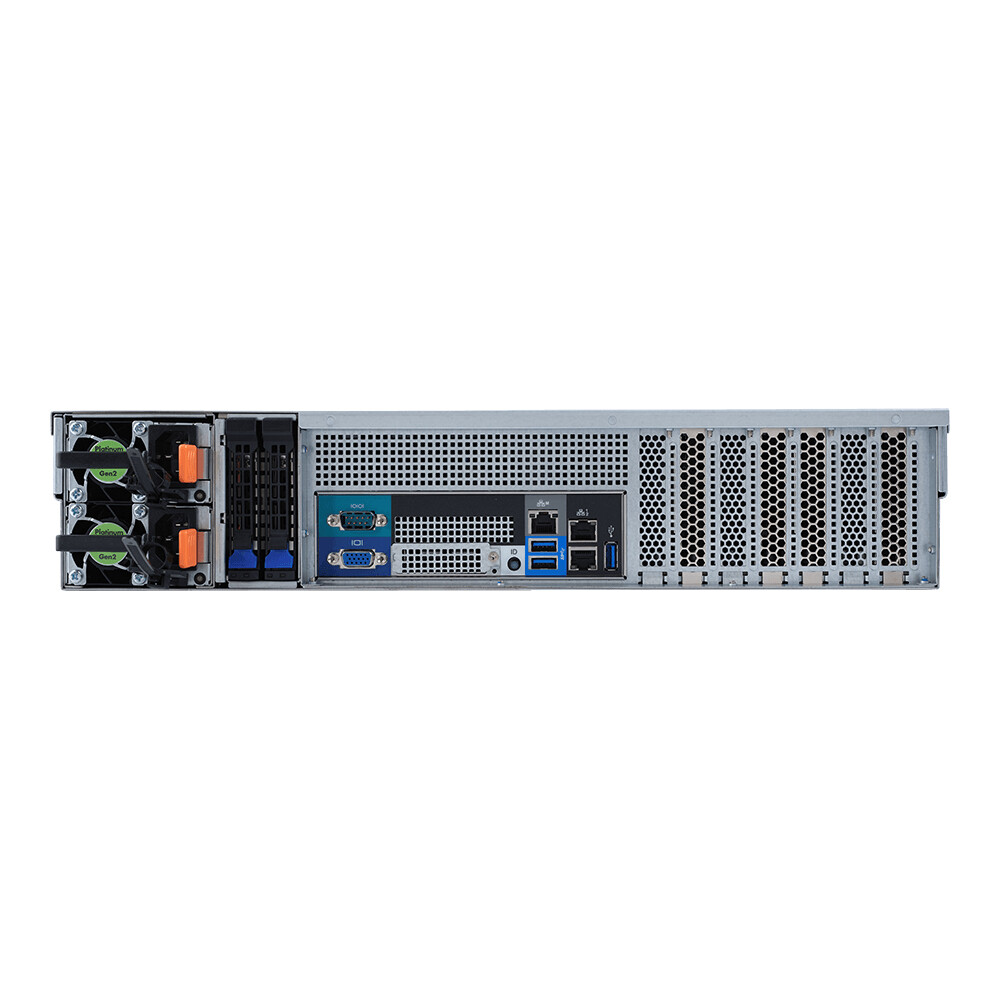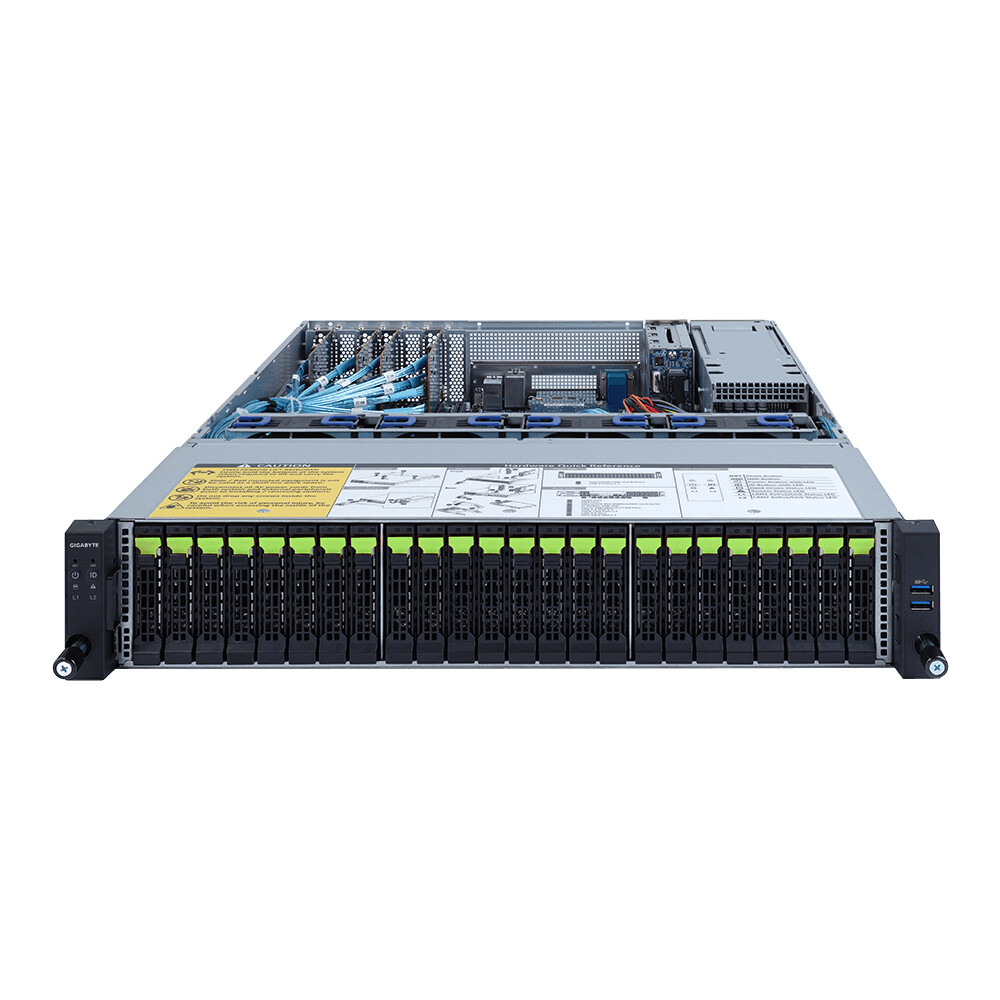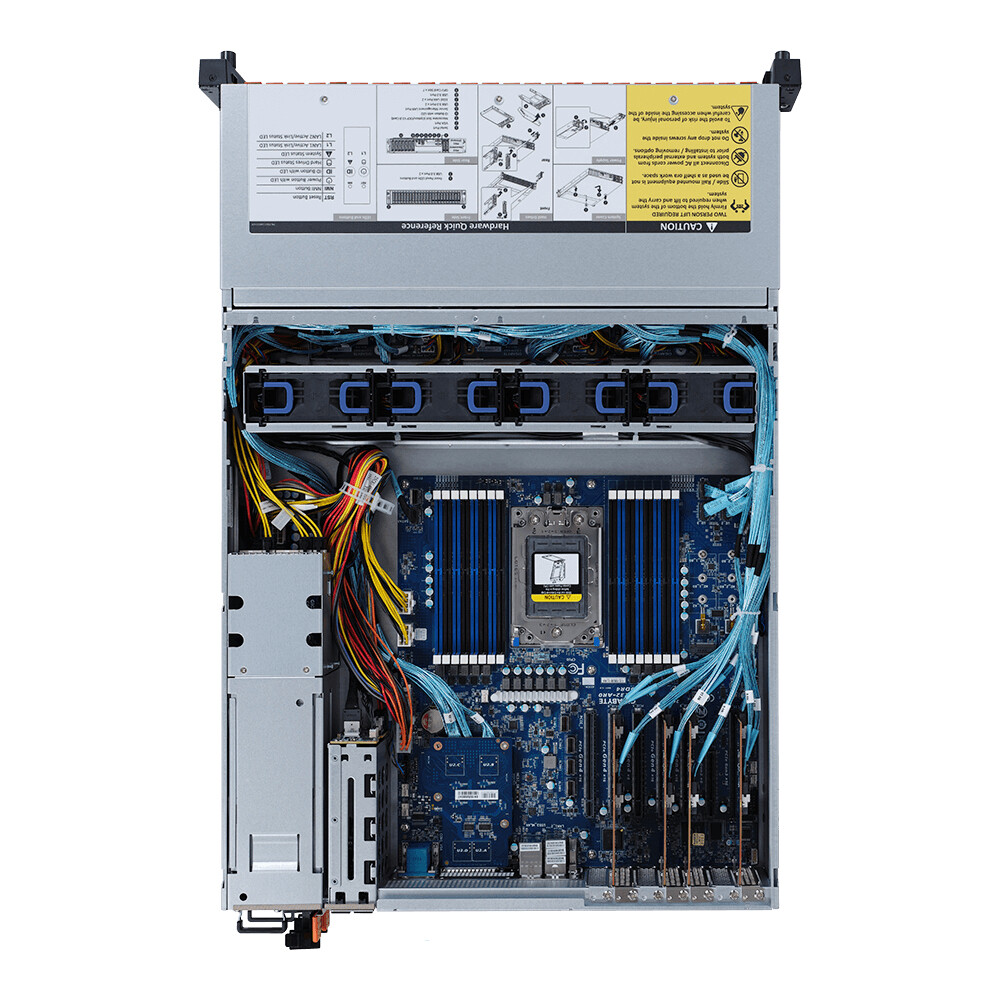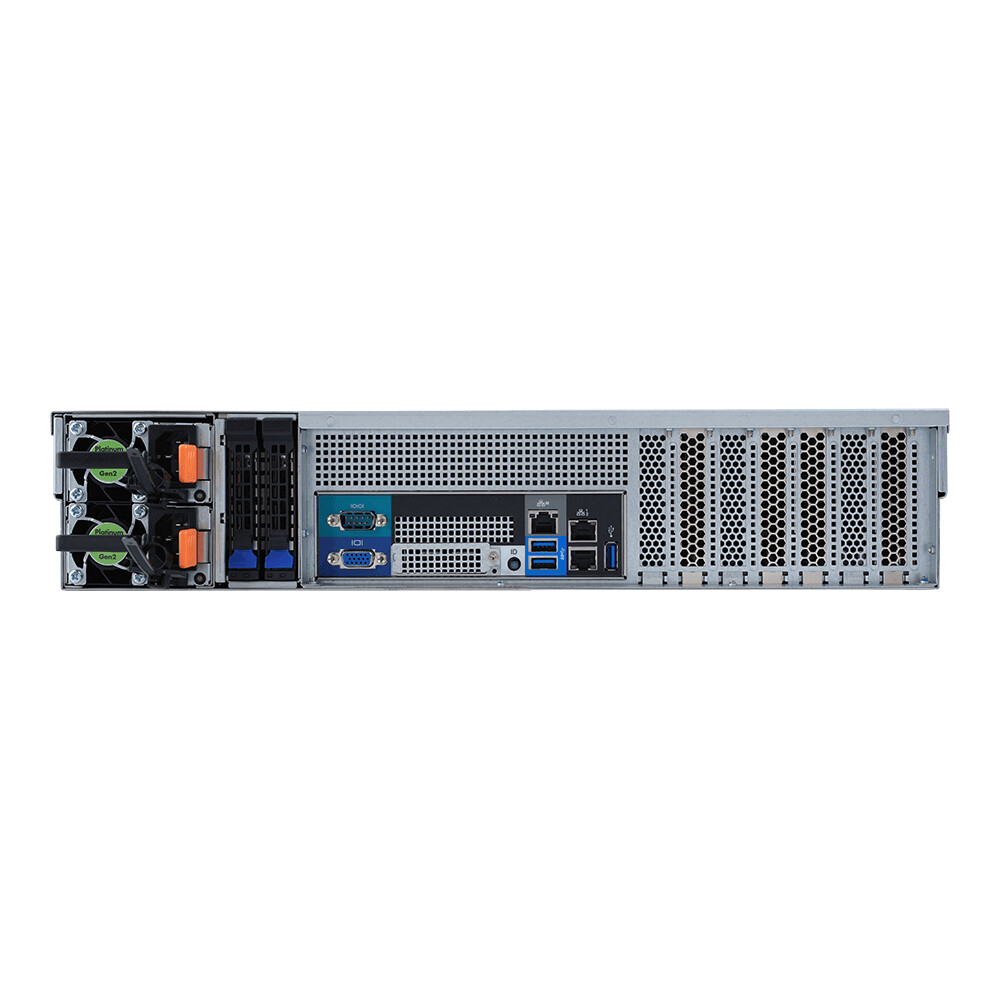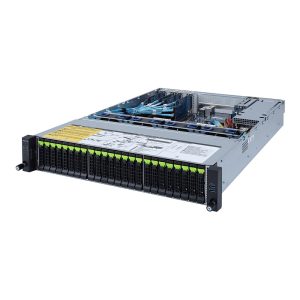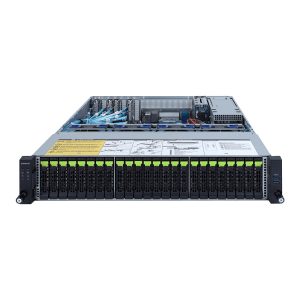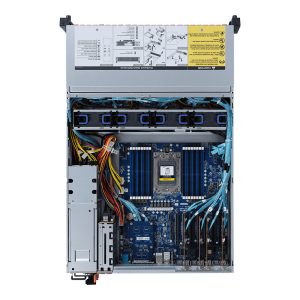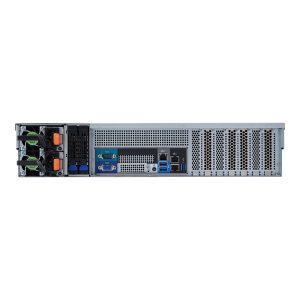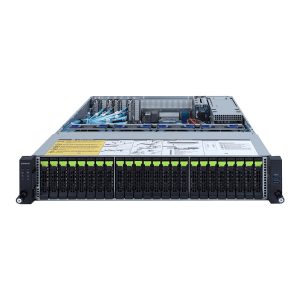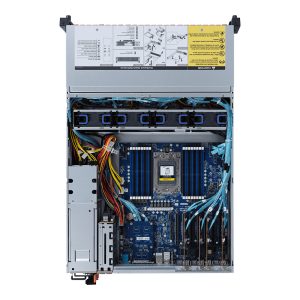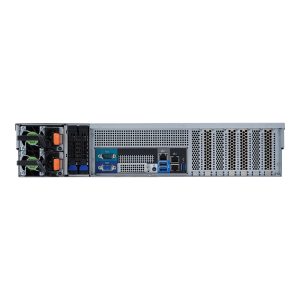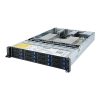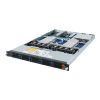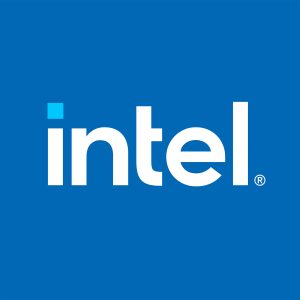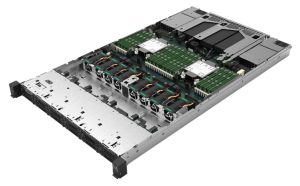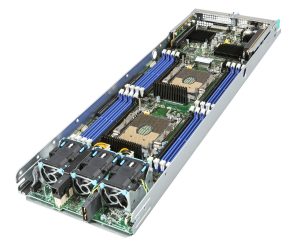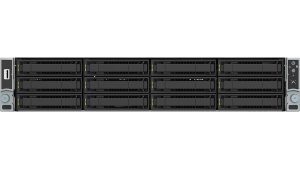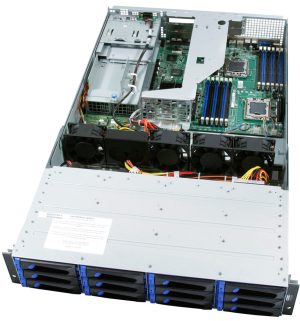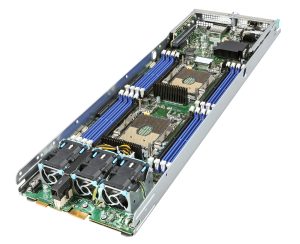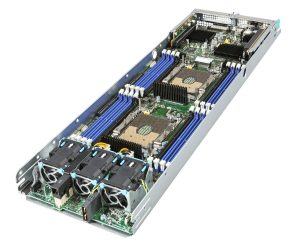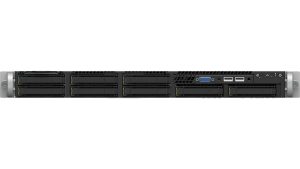Gigabyte R272-Z34 Stativ (2U) Sort
35.280,00 kr. inkl. moms (ex. moms 28.224,00 kr.)
Ikke på lager
Giv mig besked når varen kan købes

The next generation of AMD EPYC has arrived, providing incredible compute, IO and bandwidth capability – designed to meet the huge demand for more compute in big data analytics, HPC and cloud computing.
Built on 7nm advanced process technology, allowing for denser compute capabilities with lower power consumption
Up to 64 core per CPU, built using Zen 2 high performance cores and AMD’s innovative chiplet architecture
Supporting PCIe 4.0 with a bandwidth of up to 64GB/s, twice of PCIe 3.0
Embedded security protection to help defend your CPU, applications, and data
GRAID SupremeRAID SR-1000
GIGABYTE servers with GRAID SupremeRAID allow the NVMe drives to achieve much higher performance, at the same time, users do not have to compromise on service quality. The SupremeRAID SR-1000 supports from 4 to 32 NVMe storage devices and unleashes performance, 6 million random IOPS and 100GiB/s of high-performance throughput. By moving the storage operations to the GRAID SupremeRAID card, it frees up CPU computing resources and benefits 5G and AIoT implementations.
PCIe 4.0 Ready
AMD EPYC Rome is ready to support PCIe 4.0 with a bandwidth of 64GB/s, twice that of PCIe 3.0. This doubles the bandwidth available from the CPU to peripheral devices such as graphics cards, storage devices and high speed network cards. GIGABYTE’s AMD EPYC 7002 Series server platforms are ready to be used with a new generation of PCIe 4.0 devices such as AMD’s Radeon MI50 GPGPU.
Higher Memory Speed
AMD EPYC’s Rome 7002 Series processors feature faster 8 channel DDR4 memory lanes, supporting RDIMM or LRDIMM memory modules with a speed of up to 3200MHz (1 DIMM per channel)
Get the Memory Performance Edge
3200Mhz Even at 2 DIMMS Per Channel
On previous AMD server platforms, memory speed has been automatically downgraded by design when a user installed two DIMMs per channel. GIGABYTE has now developed a unique solution to overcome this performance downgrade headache: with our new 2nd Generation AMD EPYC 7002 Series server platforms, maximum memory speed (3200Mhz) is now supported even when using 2 DIMMS per channel. GIGABYTE’s server platforms give you the performance edge, with more memory capacity at faster speeds than competing solutions!
More M.2 Storage
GIGABYTE’s AMD EPYC 7002 Series server platforms feature more M.2 drive capacity for ultra-fast NVMe storage – both onboard M.2 slots and extra capacity via optional riser cards.
Support Broadcom Tri-Mode RAID Adapters
This GIGABYTE server supports Broadcom Tri-Mode RAID adapters that enable operation of NVMe, SAS or SATA storage in a single drive bay. Together with GIGABYTE’s holistic backplane that support Universal Backplane Management (UBM) protocol, it simply provides multi-protocol connectivity options that simultaneously gives users performance and flexibility of future expansions.
Silicon-Based Root of Trust
This server is embedded with a hardware-level root of trust mechanism to protect against firmware attacks by checking BMC/BIOS ’s encrypted signature to ensure that it boots up with legitimate code, and to detect compromised firmware stored in SPI flash. If all modules are validated successfully through the chain of trust, control would be handed off to OS or hypervisor, if not it will recover by replacing the illegal image with the compromised firmware version without manual intervention.
The boot statuses of BMC and BIOS can be indicated by front panel LEDs.
Max TDP Support
GIGABYTE’s AMD EPYC server platforms come ready to support the full list of AMD EPYC 7002 Series processors: up to 225W (standard TDP) / 280W (cTDP)
Data Security
TPM 2.0 Module
GIGABYTE’s AMD EPYC Server is designed to support Trusted Platform Modules (TPM – discrete cryptographic on-board processors).
Carefully Selected Components
GIGABYTE’s passive components are carefully selected to guarantee a stable operating environment and allow the processors and the memory to deliver their maximum performance. GIGABYTE’s server motherboards are built with long lasting components for a high degree of reliability and durability.
Design Features for Easy Maintenance
GIGABYTE’s AMD EPYC 7002 Series server platforms contain many tool less design features for easy installation, maintenance and removal – never worry about forgetting your toolbox or losing a screw again!
Tool-less Rail Kits
Rail kits attach to the side of the server chassis via clipping mechanism.
Tool-less 2.5” & 3.5” Drive Bays
Clipping mechanism secures the drive in place. Install or replace a new drive in seconds.
Efficient, Reliable Power Supply
GIGABYTE’s AMD EPYC 7002 Series server are designed to guarantee high conversion efficiency regardless of load. Redundant 80 Plus ‘Titanium’ or ‘Platinum’ PSUs, combined with GIGABYTE’s precision engineering, translates to super efficient power usage which maximizes the system’s power : performance ratio and reduces OPEX for the user.
Intelligent Power Management Features
Cold Redundancy
To take advantage of the fact that a PSU will run at greater power efficiency with a higher loading, GIGABYTE has introduced a power management feature called Cold Redundancy for servers with dual PSU. When the total system loading falls lower than 40%, the system will automatically place one PSU into standby mode, enabling the other PSU to take over the greater load. This can enable total system power efficiency savings of up to 10%.
SCMP (Smart Crises Management / Protection)
SCMP is a GIGABYTE patented feature that will automatically force the system’s CPU to enter ULFM (ultra-low frequency mode for minimum power consumption) when the BMC is alerted to a PSU fault or error (such as power loss, power surge, overheating or a fan problem). This feature will prevent shutdown in systems with less than 1 + 1 PSU redundancy when one PSU is lost.
GIGABYTE Management Console
GIGABYTE server utilizes the AMI MegaRAC SP-X solution for BMC server management, has a browser-based graphical user interface, and is feature-rich and easy to use.
RESTful API support includes the latest DMTF standard of Redfish. Allows integration with 3rd party applications for server management
Including HTML5 based iKVM remote management client, no need to purchase other additional licenses
Detailed FRU information from SMBIOS
10 to 30 seconds pre-event automatic recording function
SAS / RAID controller monitoring function
GIGABYTE Server Management (GSM) is GIGABYTE’s proprietary multiple server remote management software platform, available as a free download from each GIGABYTE server product page. GSM is compatible with either IPMI or Redfish connection interfaces, and comprises the following sub-programs:
GSM Server
A software program with an easy to use browser-based GUI to enable global remote monitoring and management of multiple GIGABYTE servers via each server node’s BMC.
GSM CLI (GBT Utility)
A command-line interface program to enable global remote monitoring and management of multiple GIGABYTE servers via each server node’s BMC.
GSM Agent
A software program installed locally on each GIGABYTE server node that retrieves additional node information (CPU/Mem/HDD/PCI/…) from the OS and passes it to the BMC. This information can then be utilized by GSM Server or GSM CLI.
*GSM Agent is currently compatible with Avocent MergePoint IPMI 2.0 BMC firmware, but not yet compatible with Megarac SP-X BMC firmware.
GSM Mobile
A remote server management mobile APP, available for both Android and iOS.
GSM Plugin
A plugin that allows the user to manage and monitor GIGABYTE server nodes within VMware’s vCenter.
Automatic Fan Speed Control
To achieve the best cooling and power efficiency, GIGABYTE servers are enabled with automatic fan speed control. Individual fan speed will be automatically adjusted according to CPU, DIMM, M.2, HDD, and GPU temperature sensors. When BMC detects a temperature change at a particular location, the corresponding fan speed will be changed accordingly.
Certified Ready with Software Partners
Being a member of key software alliance partner programs enables GIGABYTE to rapidly develop and validate joint solutions, enabling our customers to modernize their data centers and implement IT infrastructure and application services with speed, agility, and cost optimization.
| Vægt | 17,0000 kg |
|---|---|
| Indbygget processer | Ingen |
| Brand | Gigabyte |
| State | Default |
| Antal understøttede processorer | 1 |
| Antal DIMM-slots | 16 |
| Understøttede hukommelsestyper | DDR4-SDRAM |
| Antal understøttede lagerdiske | 26 |
| Hot-swap HDD båse | Ja |
| Antal 2.5" bays | 26 |
| Understøttede lagerdisk størrelser | 2.5" |
| Ethernet LAN | Ja |
| Ethernet-grænsefladetype | Gigabit Ethernet |
| Ethernet LAN-porte (RJ-45) | 2 |
| Antal USB 3.2 Gen 1 (3.1 Gen 1) type-A-porte | 5 |
| Antal VGA-porte (D-sub) | 1 |
| Kabinettype | Stativ (2U) |
| Produktfarve | Sort |
| LED-indikatorer | Ja |
| Bredde | 438 mm |
| Dybde | 660 mm |
| Højde | 87,5 mm |
| Vægt | 17,8 kg |
| Understøttet RDIMM-clockhastigheder | 2933,3200 MHz |
| Ethernet LAN-datahastigheder | 10,100,1000 Mbit/s |
| Understøttelse af backplane | Ja |
| Harmoniseret systemkode (HS) | 84714100 |
| Strømforsyning | 1200 W |
| On-board grafikkort, model | Aspeed AST2500 |
| LAN Kontroller | Intel® I350-AM2 |
| Knap til nulstilling | Ja |
| Antal blæsere | 4 blæser(e) |
| Ventilator diameter | 8 cm |
| Antal installerede strømforsyninger | 2 |
| 80 PLUS certificering | 80 PLUS Platinum |
| Driftstemperatur (T-T) | 10 – 35 °C |
| Opbevaringstemperatur (T-T) | -40 – 60 °C |
| Relativ luftfugtighed ved drift (H-H) | 8 – 80% |
| Relativ luftfugtighed ved opbevaring (H-H) | 20 – 95% |
| Pakkevægt | 24,8 kg |
| Tænd-/slukkontakt | Ja |
| Hukommelseskanaler | Okta-kanal |
| Antal COM-porte | 1 |
